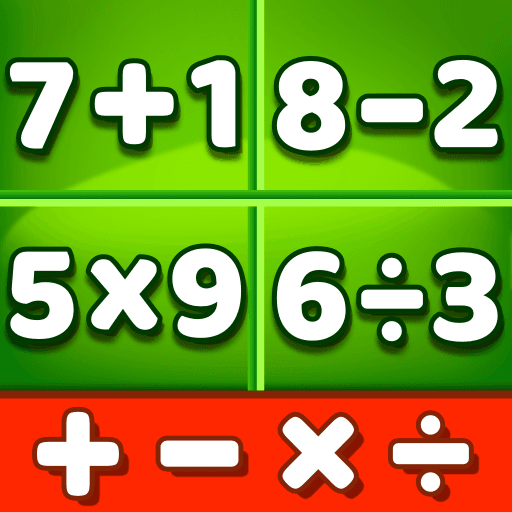Math Games: Math for Kids
RV AppStudios
25 Aug 2020
28 Nov 2024
20.22 MB
Varies with device
Varies with device
10,000,000+
Description
Math Games: Making Learning Fun for Kids
Math games for Kids. In these games, enthusiasm is combined with learning content that matter, and the child is able to learn “by play” and with reduced mental strain. Let’s see what math games are capable of doing to revolutionize the way a child learns and what they can be to provide an effective means of math skill building etc.
Table of Contents
What Are Math Games for Kids?
Math Games for Children are educative games that are created to provide and enhance mathematical knowledge in an amusing way. Such games are usually provided as apps or web 12 and they are tending to deal with different subjects, as math (addition, subtraction, multiplication and division), geometry, fractions, time, measurement and so on. Math is made both fun and engaging through engaging animations, striking visual effects and reward programs via a reward points system.
Such games are playable on a computer, tablet or on a smart phone, in order to provide a broad access to games by the youth and a flexible place (ie, house, classroom or even on the street). For a child just beginning to explore a learning path in mathematics, or to improve a learning path in mathematics, there are mathematics games that offer content that is matched to their learning level.

Math games for Kids. sanzeeapk.com
Why Are Math Games Important for Kids?
Engagement and Fun: However, class formats can lead math to seem dull, while games have the opposite effect. Playful, interesting experience offered by the games help children’s’ engagement and interest and encourage them to continue learning. Using game design principles such as scores, progressing levels, and acquisition of more challenges children are more likely to maintain a high level of attention and motivation to learn.
Developing Critical Thinking Skills: Math is not a matter of memorizing formulas and numbers. It’s about developing problem-solving and critical thinking abilities. Math games assist children in developing logical reasoning, identifying patterns, and engaging in creative thinking, of immense practical usefulness in life and in the classroom.
Personalized Learning: Most mathematics games can be modified so that the difficulty of the task increases as the child’s game score improves. With this personalized approach to education, children can try and learn at their own speed so as not to get carried away by the difficulty, but also are constantly stimulated until they finally make a progress.
Building Confidence: The more the children master levels, solve math challenges, the more confident they become. The instant feedback from math games, whether it’s a reward or encouragement after completing a level, helps children feel accomplished and motivated to tackle more complex problems.
Interactive and Visual Learning: Compared to a child, information seems to be more easily recalled when presented visually or gaming style. Math games employ flashing colors, interactive animations, gameeable characters, which renders the more abstract math topics concrete and thus more likely to be learned by the children.
Learning Beyond the Classroom: Math games provide children with an opportunity to use the material in a learning context outside the classroom. Offering an array of topics and formats, kids can learn in their free time, on a road trip, after school, or during the summer break, and math can become a pleasurable routine of their daily life.
Types of Math Games for Kids
Basic Arithmetic Games: These types of games are basic calculation games (addition, subtraction, multiplication, division). They are often referred to as simple puzzles or games of interactive puzzles in which the children solve a mathematical equation, to continue to the next or to unclose the new characters and also to the new objects.
Geometry and Shapes: These games are used to teach primary school children, geometry, symmetry, angles and spatial thinking. By means of children’s engaging activities such as shape-matching tasks or interactive puzzles, children acquire the ability to identify and grasp fundamental geometrical concepts.
Time and Measurement Games: These games share concepts of clocks, calendars and scales of linear, weight or volume. They are useful for creating scenarios in which mathematics actually counts for children, and encourage children to apply what they have learned in the real world.
Fraction and Decimal Games: These games teach lessons about fractions, decimals and percentages. For example,They employ visualizers and interactive puzzles to train children to grasp the concept that fraction fact and practicality do not come apart and are not irrelevant.
Math Challenges and Puzzles: Some games are explicitly built in order to resemble math problems in which children have to solve problems, riddles, or problems of logic. Since these games go beyond presenting a serious amount of analysis and logic-driven math skills in an entertaining manner.
Popular Math Games for Kids
Prodigy Math Game: This web-based game-composito-role-playing-game with mathematics education components. Childrens complete a quest and mathematical exercises to earn rewards and go on to successive layers. It is multidisciplinary and stretches across a long distance within elementary and middle school mathematics.
Math Bingo: This kind of bingo game is a blend of bingo and math drill. Players are engaged in mental work where they complete math problems in order to complete their own Bingo cards and to be the first to complete Bingo. It’s a really lovely one for children, which could be for practicing addition, subtraction, and multiplication.
DragonBox: Dragon Box provides various math games on algebra topics, as well as, number operations that can be easily understood by the children. DragonBox is vibrant, cartoonish and even has characters, meaning it turns math into an activity rather than a chore.
Cool Math Games: Cool Math Games is a major game and puzzle game publisher of mathematics, from logic puzzles to basic arithmetic drills. It is a good instrument for both children and adults who wish to improve mathematical capacity.
How to Make the Most of Math Games
Set Goals: Motivate your child to aim for small, attainable goals for every session. Having a goal, no matter if it’s the number of levels to finish or the type of idea to master, motivates kids and gives them purpose in life.
Make Learning Social: Games are even more fun whilst played with friends/family. You may conceive mathematical problems or competitions, and determine who could solve them in least time, as this may foster collaboration and some friendly competition.
Balance with Other Activities: While math games can be a highly effective learning tool, do not assume screen time is, overused, and also counter screen time with other learning activities like hands-on activities, reading, and playing outside, for a total learning experience.
Provide Positive Feedback: Remember to applaud your child’s academic progress, from finishing a challenging jigsaw puzzle, to understanding a new math fact. Positive reinforcement leads to a mindset and repeated return to learning.
Final Thoughts
Math Games: Math for Kids is a great way to introduce kids to the world of math in a fun and entertaining, joyful way. Through integration of education into games, such games not only can encourage children to practice necessary math, it also can instill a love for learning. Math games, through their use of interactive activities, colorful displays and critical thinking, can be a fun and educational means of turning math into something that is enjoyable to your child’s life.
So, if you’re looking for an enjoyable and educational activity that makes math fun, look no further than math games. Due to endless possibilities around and the topics they can discuss, your child will find them self-solving math puzzles in no time, while also having a blast!
1.What are Math Games for Kids?
Math Games for Kids (interactive learning games) have a goal to offer and improve the instruction, and enrichment, of a large number of math concepts, through engaging and interactive activities. These games cover areas such as hopefully, fundamental arithmetic and so forth, geometry, fractions, time and measurement, and, as such, learning mathematics is fun and easy.
2. How do Math Games help children learn math?
Math game is an interactive, colorful, animated, and gamified (with scores and levels) activity to create a feeling in the mind that mathematics is a challenge worth taking on a head to head basis. They also engage students in learning and help develop essential problem solving, critical thinking and logical skills, all of which are essential to learning mathematics.
3. Are Math Games only for basic math skills?
No! Math games cover a wide range of topics, from basic arithmetic (addition, subtraction, multiplication, and division) to more advanced concepts such as geometry, fractions, decimals, and measurement. This makes it possible to adjust game content to fit different age ranges and groups with different disabilities.
4. Can Math Games be played offline?
There are many math games available online or on apps that can require an internet connection for such as multi-player mode or in-app purchases. However, some applications can be played without an internet connection after they’re downloaded on the mobile, and so they are a good option for mobile learning.
5. How do Math Games make learning fun?
Math games employ entertaining and engaging features, e.g., colorful pictures, amusing faces, and reward functions (e.g., star or level unlocking), so as to attract children. These qualities impart to the learning process a playful challenge tone rather than a passive academic task.
6. Are Math Games suitable for all ages?
Yes, math games are designed to target several ages and levels of ability. Young children play games involving simple counting and addition, and older children play more challenging games such as algebra, fractions, and geometry. Many platforms offer age-specific content to ensure age-appropriate learning.
7. Do Math Games have educational value?
Absolutely! Math games are supervised to the utmost detail for the purpose of promoting learning and thinking capacity. They teach children to gain mathematical competence, develop problem-solving skills, and therefore increase analytical ability in high-engagement, low-pressure settings.
8. Can Math Games be used for school learning?
Yes, Math Games are an appropriate supplemental enrichment to schoolwork. They provide additional practice and help to solidify concepts taught in the classroom. Teachers can also for example embed them in lesson plans into still more and more interactive and exciting for the learners, math classes.
9. Do Math Games require in-app purchases?
For number of math games, the games are able to be played for free, however, some games are able to be purchased in app with the option to purchase extra content, power-ups and new features. Of course, such purchases are discretionary and do not affect the core game play, so children are still able to play it for free without any purchase.
10. Learning through Math Games can make kids more comfortable with math.
Although children successfully perform levels and solve mathematics problems they receive direct repetition and reinforcement of their accomplishments, and are praised, this increases the expectations and confidence in their insight. As children achieve success in tackling challenges they feel motivated to continue practicing, thereby overcoming any stage fright or frustration that may occur in the learning process associated with math.
11. Are there multiplayer features in Math Games?
There are some Math Games with multiplayer components which allow children to play against each other (or cooperativly) with friends or other players online. There are aspects that can afford a social dimension to learning, that is, children could discuss their advances with each other and challenge them.
12. Can I monitor my child’s progress in Math Games?
It is easy for Math Games to allow parents or teachers to keep track of the child’s progress as they note which levels are completed, total scores and child sections in which additional reinforcement may be needed. It is of value to parents who can continue to be involved in their child’s learning and check that the foundations of key concepts are being learnt.
13. What are some examples of popular Math Games for Kids?
Some popular Math Games for Kids include:
Prodigy Math Game: A role-playing game that combines math practice with adventure.
Math Bingo: A Bingo game, in which the players complete math problems to collect the prizes.
DragonBox: A game based on the mathematics of algebra and arithmetic with engaging graphics.
Cool Math Games: A gateway to an enormous collection of mathematics problems and brain teasers/puzzles, hosted online.
14. How can I ensure my child gets the most out of Math Games?
In order to get the best yields of the educational potential of Math Games, it is important to define well achievable goals, promote play on a regular basis and acknowledge achievement. It can also be a social activity, playing together or by comparing results with relatives. This makes the learning experience more interactive and enjoyable.
15. Are Math Games a replacement for traditional math lessons?
Although Math Games have been a very effective supplement to traditional teaching, they are not a replacement for traditional teaching or actual life math experience. Instead, they should be combined with other learning techniques for conditioning, via an interested, interactive application.
16. Are Math Games effective for long-term learning?
Yes, mathematical games can be extremely useful in a learning that is long-term and lasting by engaging children as active and manual learners. The more the children practice, the more they can master and, as the exercises are made interesting, they will repeat them every time and their math skills will deepen with time.
What's new
🔢 Unlock the fun: New Math Puzzle Mode!
🔢 Dive into our latest mode where math becomes a thrilling puzzle game.
🧠 Challenge your math skills with mind-bending puzzles that will make you rethink everything you thought you knew about numbers!
Plus, enjoy smoother gameplay with bug fixes and performance improvements. Update now to play! 🎉




